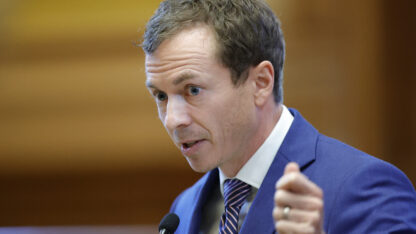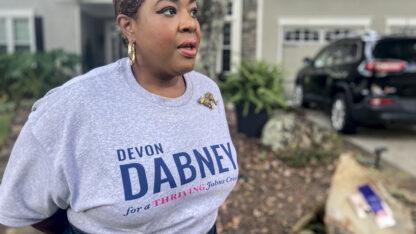At a recent closed-door meeting of roughly 60 millionaires and billionaires, one of the Republican Party’s most influential donors stood in the well of Dallas’ historic Old Parkland debate chamber and praised Nikki Haley’s presidential candidacy.
But Paul Singer deliberately stopped short of endorsing the former U.N. ambassador and South Carolina governor. The New York hedge fund executive instead spoke highly of Haley’s Republican rivals as well, naming Florida Gov. Ron DeSantis and South Carolina Sen. Tim Scott. He even praised aspects of Donald Trump’s presidency, despite Singer’s strong preference — like that of others in the room — to move past the former president.
The moment, described by two people who were inside the meeting last month and spoke on the condition of anonymity to discuss private deliberations, captures the conundrum facing the many Republican leaders eager to coalesce behind a clear Trump alternative.
While DeSantis has struggled in recent months, Haley has been rising with donors and voters thanks in part to strong debate performances and the campaign’s increased focus on foreign policy after Hamas’ Oct. 7 attack on Israel. In many ways, Haley presents exactly what key Republican donors say they are seeking: an experienced conservative leader and foreign policy hawk whose profile as a woman of color — she is the daughter of Indian immigrants — could help the GOP broaden its appeal in the general election against Democratic President Joe Biden.
But just over 10 weeks before Iowa’s caucuses launch the GOP nomination calendar, none of the would-be Trump alternatives has broken out. And his grip on the 2024 nomination is as strong as ever.
“There was a lot of donor support for Ron DeSantis at the start, but I think many donors today have stayed on the sidelines because either they fear retribution from Trump or they believe that Trump is inevitable,” said Marc Short, a longtime senior adviser to former Vice President Mike Pence, who ended his presidential campaign on Saturday.
A Des Moines Register poll published Monday shows Haley tied with DeSantis for second in Iowa, which hold the first-in-the-nation GOP caucuses on Jan. 15. Both candidates are at 16%. That’s 27 percentage points behind Trump, whose support was virtually unchanged since August in spite of several criminal indictments and fears that he might lose again to Biden.
Haley and DeSantis are in an increasingly expensive battle against each other as they head into the third Republican primary debate next week. Trump will skip the prime-time event, as he has the first two debates. Some super political action committees allied with Haley and DeSantis have spent more than $2.5 million combined over the past week running attack ads against each other that are largely focused on China, according to tracking firm AdImpact.
Neither Haley nor DeSantis is currently devoting any advertising dollars to criticizing Trump.
Still, Haley, 51, is showing signs of momentum.
She has won over new donors in recent weeks, including former Illinois Gov. Bruce Rauner, a businessman and philanthropist who had contributed to DeSantis’ campaign for governor but now says Haley has the “best chance to win the general election.”
Haley has clear strengths as a candidate.
In both debates so far, she memorably cut down entrepreneur Vivek Ramaswamy on foreign policy issues and quickly rebutted attacks. She has never lost an election, having entered the 2010 primary for South Carolina governor as an underdog before defeating three better-known candidates. As the sole woman among the GOP’s presidential candidates, Haley often references her own struggles with pregnancy to discuss her opposition to abortion, an issue that some Republicans fret puts them opposite a majority of voters nationally.
Rauner said Haley’s foreign policy credentials and her strong relationship with Israel elevates her over the rest of Trump’s would-be challengers and helps him raise money for her.
“She’s a tough person who understands the international dynamics better than anyone in the race. She was a phenomenal ally for Israel when she was at the U.N.,” Rauner said. “And I think the tragedy in Israel — it’s absolutely horrible, and unfortunately it’s going to get worse –- she’s uniquely positioned to make a difference,” he said.
Haley is also facing more criticism from people usually content to focus on Trump.
Democratic National Committee Chairman Jaime Harrison, who is also from South Carolina, posted Monday that Haley was “a dangerous, out of touch MAGA extremist governor who was a complete disaster for our state.” Harrison wrote on X, formerly known as Twitter, referring to Trump’s “Make America Great Again” slogan.
Gov. Gavin Newsom, D-Calif., singled out Haley when asked during a recent interview which Republican he believes would be stronger than Trump in the general election. Newsom pointed to Haley’s first debate performance and “the conventional wisdom” that suggests she could do better than Trump among key demographics, such as suburban women.
Trump, who has long focused his attacks on DeSantis, spent more time belittling Haley during an appearance Sunday in Sioux City, Iowa, referring to her repeatedly as “a highly overrated person.”
But some of the GOP’s most influential financiers have been reluctant to commit to her, even after expressing concerns about DeSantis, who was initially thought to be the strongest Trump alternative.
Singer, the New York finance executive, was among the attendees at the Dallas conference known as the American Opportunity Alliance.
Representatives of DeSantis and Haley were invited to present to the group.
Singer has not donated any money directly to Haley nor to her super PAC despite his eagerness to identify and support a clear Trump alternative, according to people familiar with his thinking who spoke on condition of anonymity to share private discussions.
Chicago hedge-fund billionaire Ken Griffin was a prominent booster of DeSantis before the governor ran for president but has criticized him in recent months. Griffin referred to Haley in October as a “rock star,” according to Business Insider magazine. But he has not yet signed onto her campaign either, according to friends and fundraisers familiar with Griffin’s thinking who also spoke on condition of anonymity.
DeSantis’ team remains bullish about his prospects, dismissing reports that his candidacy has stalled out and investing heavily in an Iowa comeback.
Polling suggests that DeSantis remains competitive in the fight for second place. In recent days, however, DeSantis’ allies have directed significant resources into ads taking on Haley, indicating that they see her rise as a direct threat to his ambitions.
New York-based Republican donor Eric Levine has been calling for Trump opponents to unite behind someone for much of the last year. While he likes Haley’s muscular foreign policy and her political appeal, he recently decided to support Scott, the South Carolina senator.
“We need to winnow it down to two or three,” Levine said of the GOP primary field, adding that Scott should leave the race if he does not finish at least third in Iowa. “Once you get to Iowa, then you figure out who’s the Trump alternative. Iowa and New Hampshire have to define that.
After New Hampshire, or Iowa, you’ve got to be one person — maybe two.”
Haley has held 40 events in Iowa and appears to be attracting prospective caucusgoers, if nowhere near the crowds that routinely turn out for Trump.
Donna Valiga, a 72-year-old self-described former “Trump girl,” was among 200 people who came to see Haley at an event center in Cedar Rapids. She said she loved Haley’s suggestion in a television interview that Israeli Prime Minister Benjamin Netanyahu “finish them,” as a reaction to the Hamas attack against Israel.
“I see her as being very direct. She’s got the experience and it shows. You know exactly what she’s going to do,” Valiga said. “She’s heard people say ‘Death to Israel. Death to America.’ I think she possesses the depth of knowledge and passion we need.”
Peoples reported from New York. AP Director of Public Opinion Research Emily Swanson in Washington contributed to this report.
This story has been corrected to reflect that the Iowa caucuses are just over 10 weeks away, not six weeks.









